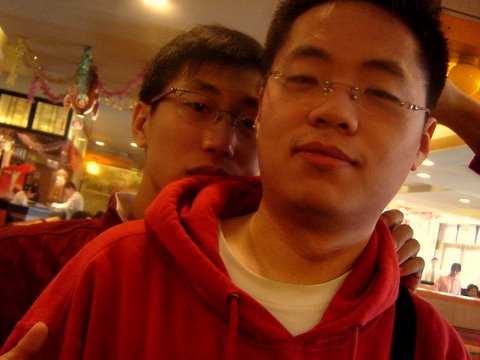The bigger you are,the harder they fall. by The economist
这篇分析陈良宇下台影响的文章还是经济学人的一贯口吻,翻译中间两段有代表性的言论。
China
The harder they fall
Sep 28th 2006
From The Economist print edition
What the firing of Shanghai's party boss says about China
 ABROAD, China likes to portray itself as a responsible power to be reckoned with. But at home its Communist Party is still a law unto itself. As Shanghai's once-powerful party boss, Chen Liangyu(The People’s Daily has a profile of Mr Chen.), is now experiencing for himself, party investigators have the power to detain members suspected of wrongdoing indefinitely, with no access to lawyers. The party will decide whether to forgive any sins that have been committed, or hand over the accused to the police. The verdict will be reached in utter secrecy.
ABROAD, China likes to portray itself as a responsible power to be reckoned with. But at home its Communist Party is still a law unto itself. As Shanghai's once-powerful party boss, Chen Liangyu(The People’s Daily has a profile of Mr Chen.), is now experiencing for himself, party investigators have the power to detain members suspected of wrongdoing indefinitely, with no access to lawyers. The party will decide whether to forgive any sins that have been committed, or hand over the accused to the police. The verdict will be reached in utter secrecy.Such is the spine-chilling world in which Mr Chen, until last week in charge of China's showcase of modernity, now finds himself (see article). He is accused of involvement in the misuse of $400m of Shanghai's pension fund, of helping relatives in criminal ventures and of covering up law-breaking by aides. But his political demise is about more than alleged sleaze. In power struggles at the top of the Chinese leadership, charges of corruption are often a convenient weapon. Meanwhile, corruption is made worse by the party's handling of China's fast-changing economy.
Getting the wrong sort of grip
President Hu Jintao is fighting to impose his authority on wayward localities which are defying efforts to rein in economic growth and prevent a frenzy of ill-considered investment that could further cripple the banking system with bad loans. Before a five yearly party congress late next year, Mr Hu also wants to install loyalists in key posts in the provinces. Mr Chen owed his job in Shanghai to Mr Hu's predecessor, Jiang Zemin, making him an obvious target. He is also widely rumoured to have attacked Mr Hu's economic-control measures at a meeting of the ruling Politburo two years ago.
By taking on Mr Chen—the first Politburo member to be dismissed in more than decade—Mr Hu is flexing his muscles. But he is also showing how little the party has changed. When he first came to power in 2002, he seemed to signal that he would make the party more open and subject to the rule of law. Instead, its investigations are still driven by politics. Corruption is just as rife. The 200-member Central Committee is supposed to monitor the work of the 24-member Politburo headed by Mr Hu, but at its annual meeting next month it will rubber-stamp whatever is put before it.
Mr Hu's difficulties in taming the economy—it grew by 11.3% year-on-year from April to June, its fastest quarterly rate in more than a decade—show how far the party has yet to go in embracing market mechanisms. It far prefers to manage by administrative fiat—issuing orders to clamp down on this or that type of investment—rather than allow interest or exchange rates to do the job. That encourages local officials to beg for special favours. More than 5,000 localities from provincial down to county level have opened offices in Beijing in recent years, spending some $2.5 billion annually on lobbying, according to China's media—and fuelling corruption.
Hu的困难在调控经济——第二季度经济同比增长11.3%,这是10多年来最快的季度增长率——表现出中共在市场工具的使用上依然有很大差距。偏好使用行政命令来管理经济——通过发号施令来抑制这样或那样的投资——而不是使用利率和汇率的手段来完成这些工作。从而鼓励了地方政府对特殊政策的“等、靠、要”。据中国媒体报道,近年来,超过5000个由各省甚至县级政府开设的办事机构都派驻到了北京,每年花费在向中央的游说上的”活动“经费竟有25亿美元之巨——这里面更易滋生腐败。
Shanghai has prospered on Mr Chen's watch. He helped it win the right to host the World Expo in 2010. But Shanghai's citizens will not mourn his fall. There is deep cynicism in Shanghai and the rest of China about the probity of party officials. There is also great scepticism that the party can do anything about it. By lashing out at Mr Chen, while resolutely eschewing a free press, an independent judiciary and competitive elections, Mr Hu does nothing to reassure.
上海在陈的领导下达到了繁荣。他帮助上海赢得了2010年世博会的举办权。但上海市民并未对他的下台抱有同情。深深的怀疑笼罩着上海和中国其他地区,这种怀疑是针对中共的诚实的。对中共能否铲除腐败民众也深表疑虑。陈被惩办了,但由于极力避免新闻出版自由,独立陪审团制度和竞选制度,Hu在这些方面并未有任何进步。
 Save to del.icio.us
Save to del.icio.us






没有评论:
发表评论